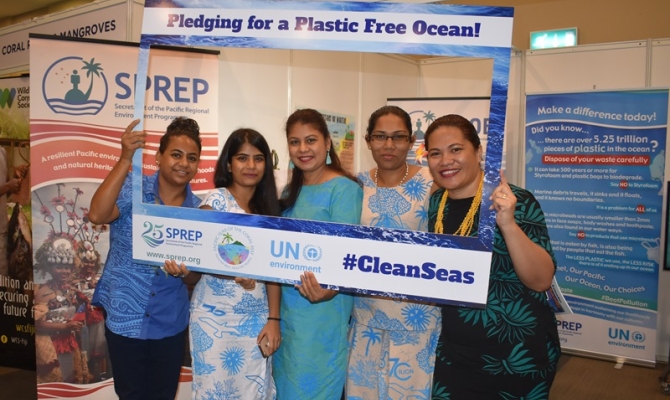
Celebrating World Oceans Day: Message from the Acting Director General of SPREP, Mr Stuart Chape
8 June, 2018, WORLD OCEANS DAY - World Oceans Day has been celebrated each year since 1992. We have witnessed increasing world attention on our oceans, particularly in the face of extreme climate impacts, alarming pollution loads and competition for ocean resources.
World Oceans Day 2018 in the Pacific has particular significance for us. The Pacific is celebrating the International Year of the Reef (IYOR) 2018 and Pacific Year of Coral Reefs (PYOCR) 2018-2019 and our 25th Year Anniversary. Coral reefs are a critical part of the ocean world in which we live. They support a major part of our daily subsistence needs and economies; they provide a living wall of protection from ocean waves; and much of our cultural identity is linked with our reefs and ocean. SPREP and our partners have several activities underway in 2018 and 2019 to campaign for coral reefs and assist our member countries in strengthening coral reef management capacity.
On World Oceans Day we recognise the immense beauty and values of the Ocean, but also remind ourselves of the immense work needed to address the increasing problems of climate change, ocean warming, ocean acidification, over-extraction of resources and the impacts these all have on coral reefs, fisheries, biodiversity and a host of other biological and ecological processes in our Ocean.
The degradation and loss of coral reefs means reduced protection of our coastal areas, declining fish for food security and lowered resilience of our island communities and economies. We are all contributors to these impacts, and each of us are affected in some way, so we should all be involved in designing and implementing joint solutions towards regaining a healthy Pacific Ocean. What we do on land directly affects the waters and life in our coastal and ocean environments. SPREP and our partner organisations in the Pacific are working towards improving multi-sectoral governance and integrated management of our islands and ocean, where holistic thinking and solutions are needed to re-build ocean health.
2018 is also a year when the world has focussed on marine debris and marine plastics, with several countries recognising the hidden impacts of micro-plastics on the ocean. Plastics, heavy metals and other pollutants are consumed by marine organisms, with numerous lethal and other impacts. These impacts eventually reach humans as well through the fish we consume. Other species of conservation importance like sea turtles and whales are caught in discarded or abandoned fishing gear, and usually suffer slow, cruel deaths.
As the Pacific region's inter-governmental organisation for the environment, SPREP with its partners assists its member countries and territories to better manage and conserve their ocean resources through programmes and projects on best practice island and coastal zone management, marine spatial planning, marine protected area management, coral reef management and monitoring, invasive marine species management, conservation of threatened and migratory marine species such as sea turtles and whales, waste management and pollution control. Our role extends to assisting countries in building their resilience to impacts of climate change, including ocean warming, ocean acidification, sea level rise and more.
I encourage all of you to celebrate the magnificence and importance of oceans today, but to use this moment to inspire discussion on how we can all better use the oceans, helping each other in protecting the health of our oceans. We can each do more, such as being careful not to over use our ocean resources and to not abuse our ocean habitats with thoughtless dumping of our wastes and pollutants. These and much more, are some of the things we must do not only on World Oceans Day, but from this day forward.
I want to acknowledge all those people who are working to help re-build the health of our oceans, and wish everyone a memorable World Oceans Day for 2018. - Mr Stuart Chape, Acting Director General, SPREP